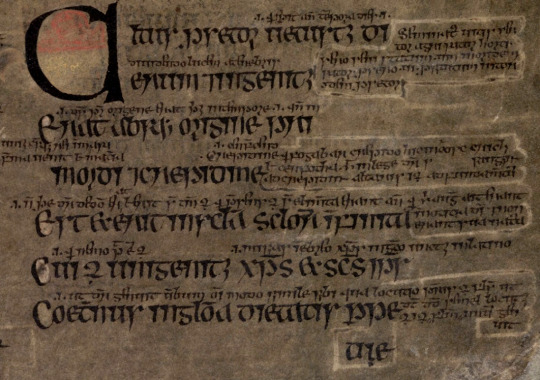#also he's gonna go Turbo Conductor Wizard on it
Explore tagged Tumblr posts
Text
An excerpt from Altus Prosator, a choral setting by Douglas Buchanan of the 6th century Irish poem of the same name, sometimes attributed to St. Columba. The poem is written in Hiberno-Latin, a form of Latin used by Irish monks in the 6th through 9th centuries. Being so isolated from mainland Europe, the language developed its own words based on independent scholarship and local influence; for example, the word "iduna" is used to mean "hands", which stems from Hebrew rather than Latin ("yadaim").

The poem is also "abecedarian" - each stanza begins with a different letter, making 23 total stanzas (Latin has no J, initial U, or W). The choral work accordingly has a movement for each stanza; the above is Movement "Z", "Zelus ignis furibundus":
Zelus ignis furibundus
consumet adversarios
nolentes christum credere
deo a patre venisse
nos vero evolabimus
obviam ei protinus
et sic cum ipso erimus
in diversis ordinibus
dignitatum pro meritis
premiorum perpetuis
permansuri in gloria
a saeculis in saecula.
----
The raging fury of fire shall consume the adversaries, unwilling to believe that Christ came from GOD the Father; but we shall forthwith fly up to meet Him, and so shall we be with Him in divers orders of dignities according to the everlasting merits of our rewards, to abide in glory, for ever and ever.
The full recording is viewable here.
#I got to do this last week#so here it is#music history#irish history#manuscript#being conducted by the composer of the piece is fun bc you know that's how it was meant to be conducted#god and his conscience are perfectly agreed#also he's gonna go Turbo Conductor Wizard on it#now whether we are singing it the way he conducted it is a matter for scholarly debate#the end circles back to the text from the beginning
21 notes
·
View notes